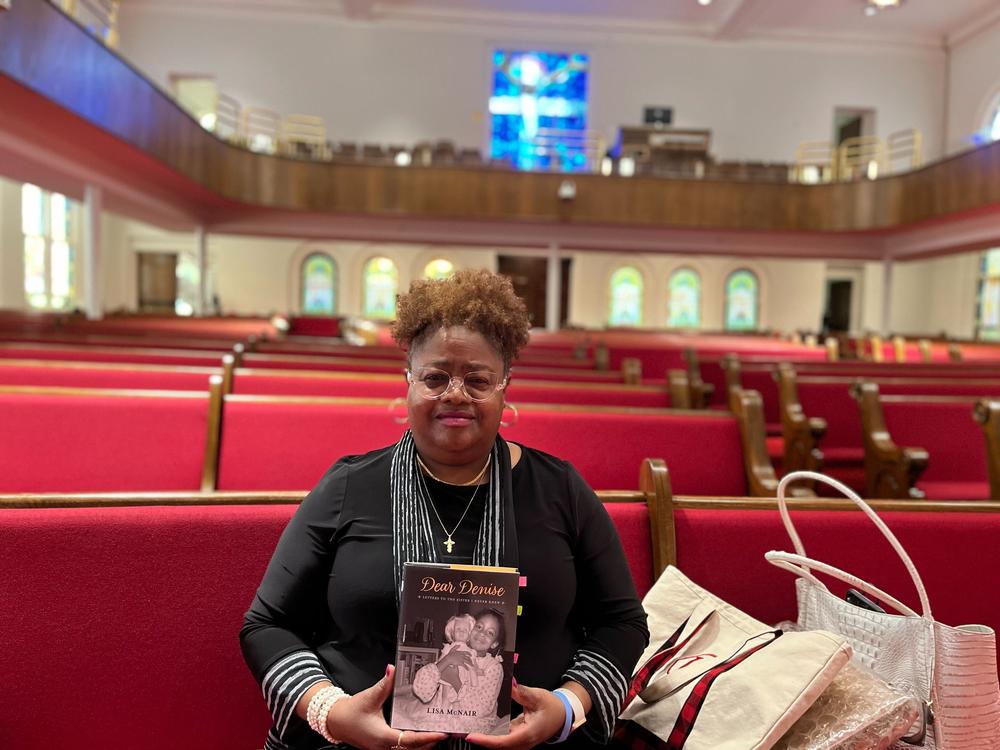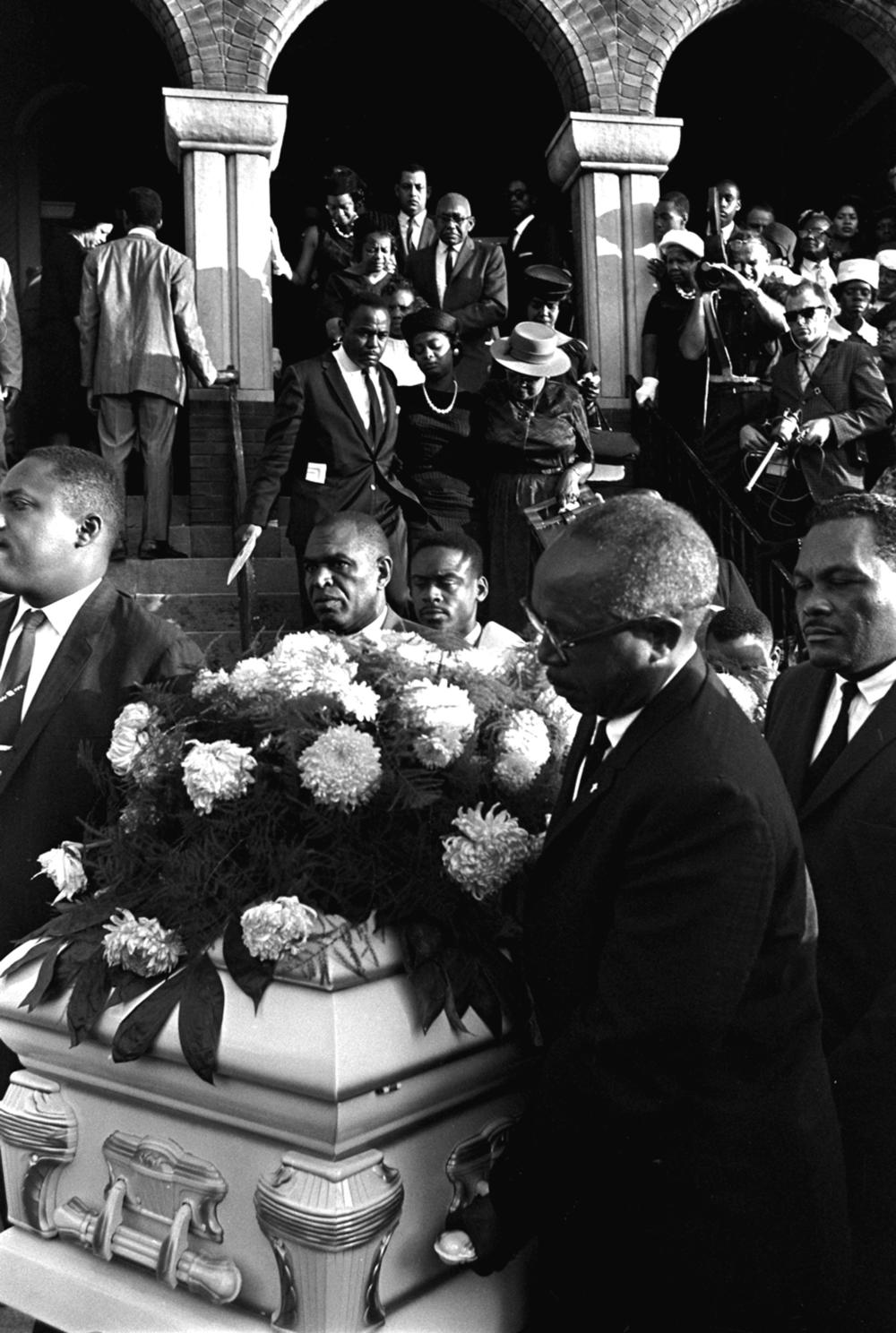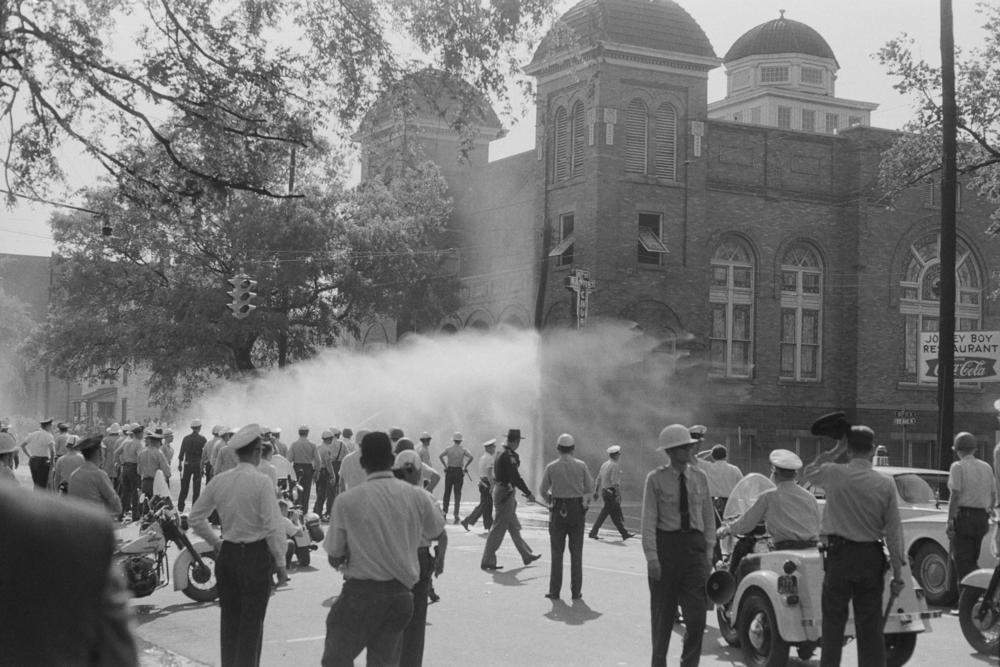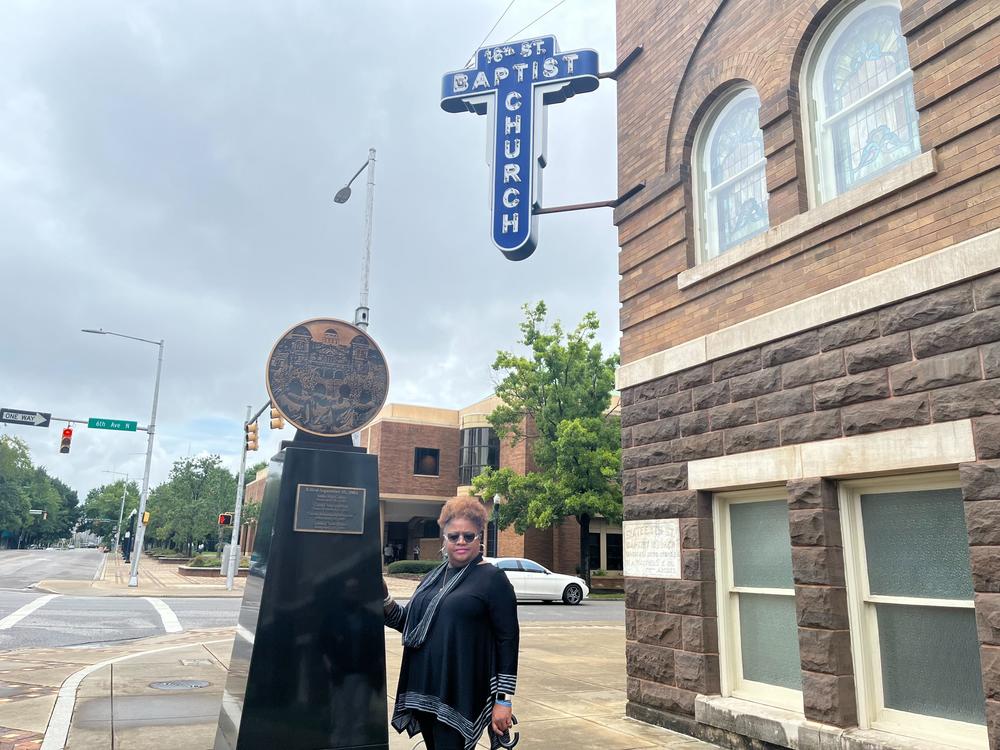Section Branding
Header Content
Her sister was killed in the Birmingham church bombing. A new book tells their story
Primary Content
BIRMINGHAM, Ala. — The 16th Street Baptist Church is an iconic landmark with its blue neon sign, dramatic stained-glass windows, and imposing twin bell towers. It was here on Sept. 15, 1963 that a Ku Klux Klan bomb killed four Black girls.
Near the back corner of the building is a grave-like stone etched with the names of the victims — Addie Mae Collins, Carole Robertson, Cynthia Wesley, and Denise McNair.
"She was the youngest of the four," says Denise's sister, Lisa McNair, standing outside the church just a few weeks before the 59th anniversary of the bombing. "She was 11. And the other four girls were 14, just beginning their freshman year in high school."
In a new memoir, entitled, Dear Denise: Letters to the Sister I Never Knew, McNair recounts growing up in a newly-integrated Birmingham after the notorious bombing that killed her sister.
"The sermon that was going to be that day was 'A Love That Forgives,' " McNair says. "The sermon that the minister never got to give."
Birmingham church bombing seen as turning point
McNair points to where Klansmen planted dynamite under a stairwell before Youth Sunday. She says the girls were freshening up between Sunday School and the worship service when the bomb detonated.
"They had just come out of the ladies' lounge and were standing near this window," McNair says. "That's where they got the full impact."
The crime drew worldwide attention to the violent resistance to equal rights in the American South, and galvanized support for the Civil Rights Act.
"The innocent blood of these little girls may well serve as a redemptive force," the Rev. Martin Luther King, Jr. said in a 1963 memorial service, calling the bombing a turning point.
McNair didn't hear that historic eulogy. And she never met her sister Denise. Lisa was born a year after the bombing, her family still grieving.
"It's shaped my whole life," she says.
In Dear Denise, McNair, now 57-years old, imagines what it would have been like to have a relationship with her big sister.
"I cannot recall a time when I didn't know about you and how you died. ...it is my first and oldest memory. It is a strange feeling to have a sister who died before you were born, especially in such a tragic and public way, and this feeling has been and always will be a part of who I am. Your death thrust all of us, Mamma, Daddy, Kim, and me, into the surreal limelight of history."
She always wanted to write a book about growing up in the shadow of the bombing but didn't know where to start
McNair says she's always wanted to write a book about her experience growing up in the shadow of the bombing but never knew where to start. A friend recommended letters to Denise, and the stories began to flow, along with a deeper connection with her sister.
"It just worked really well," she says. "At times I would think, 'Boy, I would really like to be having this conversation with you alive.' "
The book is both a personal look at how the McNair family endured, and a broader reckoning with the ongoing fight against racism in Birmingham. The city was famously known in the civil rights era as "Bombingham" because of the KKK's vicious reign of terror against Black activists.
McNair fills Denise in on the birth of their baby sister Kimberly, and how their father, Chris McNair, became one of the first Black lawmakers elected to the Alabama legislature since Reconstruction. There are sad and vivid memories of her mother weeping at Denise's graveside as the family would visit the cemetery year after year. And Lisa's experience being among the first generation of Black students to attend integrated schools as a beneficiary of the change wrought by her family's tragedy.
Finding sisterhood through shared pain
She also writes about a woman she bonded with over the years who would help fill the void of losing her big sister. It's Reena Evers-Everette, daughter of Medgar and Myrlie Evers-Williams. Her father, Medgar, was the Mississippi civil rights leader assassinated by a Ku Klux Klansman in his Jackson driveway just three months before the Birmingham church bombing.
Evers-Everette says her relationship with McNair is a special one.
"We call each other sister," says Evers-Everette, executive director of the Medgar and Myrlie Evers Institute.
She recalls that when they first met at a civil rights memorial event in 1989, she told McNair how her middle name was Denise, just like Lisa's late sister.
"And we connected by talking about the pain of losing a loved one so tragically, so brutally at the hand of hate," Evers-Everette says. "And talking about what it's like to live in the fishbowl of that."
And living for years with no justice. It would take decades before convictions came in both crimes.
"There was kind of a culture of silence," McNair says. "People didn't talk for years about it."
Her book describes the lingering trauma in Birmingham because of that.
"Collective, untreated, undiagnosed trauma," she says. "Everybody went back to work or school on Monday like nothing ever happened ... because you knew as an African American at that point, you really didn't have the right to vote. Nobody was going to prosecute a white person for killing a Black person. So you just went on, turned it over to Jesus and kept on living."
A search for identity in a newly-integrated America
In the meantime, McNair was struggling to find her own identity in a changing country – a major theme in her book. McNair says after the bombing her parents enrolled her in a mostly white private school and she found herself navigating two separate worlds with no playbook.
"I'm just paving the way, not of my own volition, for what the next phase of America is supposed to look like," McNair says.
But she says she caught hell for it.
"Because I don't look like, I don't sound like, I don't act like what has been traditionally what Black people do," she says. "I was made to feel that I didn't fit in and I wasn't Black enough."
Evers-Everette says writing honestly about that took courage.
"I applaud her for being raw and real," she says.
She hopes McNair's memoir will open a dialogue about what acceptance of all humanity really looks like.
"Are you accepting me because of my color on my skin? Are you not accepting me because of that at first glance?" she asks. "That's a tragedy of hate that is short sighted."
Outside the 16th Street Baptist Church, McNair notes how tour buses now bring people on pilgrimages here as part of the Birmingham Civil Rights National Monument.
She says she wants people to feel the "weight of the hate and the hurt that people experienced" here.
"This is an American story, and all Americans should come and see where some people took hate so far," McNair says. "We've got a lot of hate in our country now and they think it's a thing and it's okay. But this is what hate looks like when it just gets out of control."
McNair says it should be a cautionary tale in today's polarized climate, which she fears could lead to renewed racial violence.
Copyright 2022 NPR. To see more, visit https://www.npr.org.
Bottom Content




